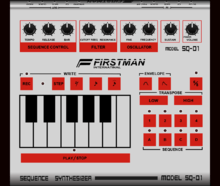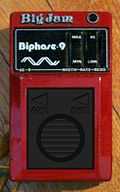Multivox
Multivox was an American-based synthesizer company since the mid-1970s until the 1980s. Originally it was founded in the mid-1940s as the guitar and amplifier manufacturing subsidiary of Peter Sorkin Music Company (Sorkin Music), a New York-based retailer/wholesaler. Then eventually it established separate corporate identity, and after the close of Sorkin Music in the mid-1970s, it continued in existence for fourteen years, according to the Blue Book of Guitar Values.[1] They specialized in delivering Japanese-designed and built equipment to the American market. They were criticized as having design and circuitry extremely similar to but inferior to designs by Roland. Multivox ceased trading in the early 1980s having "faded into synth history", according to the Synthmuseum.[2] In addition to synthesizers, the company marketed several Effects pedals. These included the Big Jam series guitar effects line.
_(clip).jpg)
Re-branding
As a result of the old criticism of Multivox synthesizer technology and their comparisons with Roland hardware, several hoax/fraudulent cases have occurred. The main hoax was based around a Multivox MX-3000 synthesizer (the flagship of the Multivox range). These machines are quite rare although not particularly sought for by collectors and musicians. Hence when a Roland MX-3000 was offered for sale much controversy surrounding the original Multivox design was stirred up. Eventually the seller admitted that the synthesizer was in fact Multivox, but he had re-badged it in an attempt to generate interest. [3]
The Multivox range
Synthesizers
Multivox produced over 15 different types of synthesizers, almost all with names beginning with "MX-" (except for SQ-01).
- MX-20 - An electric piano produced from 1977 to 1978.[4] Had five presets (high/low piano and clavichord and 'honky tonk') and a bass split with independent volume control. 61 key keyboard. Tune, Sustain and vibrato controls.
- MX-28 - The MX-28's literature says (C)1981. It is very similar to MX20 except that it uses sliders instead of rotary knobs and has a Phaser instead of vibrato. It also has a built in speaker on the right side. The 'high/low' variations of the voices is omitted, but on this machine you can actually blend the voices together.
- MX-30 - This model is a slight expansion on the MX-20 having a 61-key velocity-sensitive keyboard.[5]
- MX-51 - Another piano-based model.
- MX-57/Electro-Snare - A drum synthesizer with 2VCO/VCF/VCA/SWEEP.[6] The design is similar to the Star Instruments SYNARE 3.
- MX-65 - Polyphonic Keyboard with 6 string sounds. Envelope, LFO and Ensemble controls.
- MX-75 - Duophonic preset synthesizer with aftertouch effect. Also known as Pulser M75.
- MX-99 - Mini Echo - An analog delay with volume tone repeat and delay controls
- MX-150/Basky II - An organ-style bass pedal.[7]
- MX-202 - String & Bass ensemble. Very similar to the Roland RS-202 synthesizer.[8]
- MX-440 - Same as above. Some MX-440 might be re-badged MX-202.[9][10]
- MX-450 - Very rare Bass Pedal.[11] Little is known. More sources needed.
- MX-880 DUO - Same as below.[12]
- MX-2000 DUO - Duophonic preset synthesizer with aftertouch effect. Though it has the similarity with Roland SH-2000 on design,[13] but they are different instruments.[14]
- MX-3000 - The largest and most feature-laden synthesizer of the range. Includes an individual bass synth, preset synth, preset edit synth, and monophonic lead synth. And a blend control for all 4 synths.

Digital sequencers
- SQ-01 - A combination of synthesizer and sequencer . Performs the same functions as a Roland TB-303 with the acid capabilities.
Also note that SQ-01 was originally released in 1980 as a Firstman product,[15] and it is original. - MX-8100 Sequencer - Digital keyboard sequencer with up to 4 patterns depending on how much memory you use for the patterns. The MX-8100 has separate outputs for V/Oct and Hz/V control voltages.
- MX-S100 - Misreference- no such model exists.
Effect processors
- LD-2/Little David - One of the world first Leslie speaker simulator.[16]
Big Jam series - guitar effect pedals

- SE-1 Phaser - Phaser
- SE-2 Spit Wah - Auto Wah
- SE-3 Compressor - Compressor
- SE-4 Octave - Octaver
- SE-5 Flanjam Flanger - Flanger
- SE-6 Graphic Equalizer - 6 band analog EQ band sliders for 100 Hz, 200 Hz, 400 Hz, 800 Hz, 1.6 kHz, 3.2 kHz
- SE-7 Delay Machine - Delay/Reverb with Mode switch for Delay/(Rev)erb, Delay, Repeat, (Bal)ance
- SE-8 Distortion - Distortion
- SE-9 Biphase Phaser - Dual Phaser with Width, Rate, and (Reso)nance sliders
- SE-10 Quartz Guitar Tuner - Tuner
- SE-11 Jazz Flanger - Flanger
- SE-12 Chorus - Chorus with Warp, Speed, Depth sliders
- SE-13 Space Driver - Boost/Overdrive with Expand, Drive, and Level sliders
- SE-14 Stop Noise - Noise Gate with Sensitivity and Decay slider controls
- SE-15 "Unknown" -
- SE-16 "Unknown" -
- SE-17 "Unknown" -
- SE-18 Parametric EQ - Parametric Eq
- SE-XP Pulse Regulator Power Supply - A Power supply that powered up to 5 Big Jam Effects units via 9 volt dc supply and cables.
- SE-PB Pedal Board - Self-enclosed pedal board that included the SE-XP Pulse Power Supply and room for up to 5 Big Jam Effects in a flight case design with power cables and linking audio jacks connections.
See also
External links
| Wikimedia Commons has media related to Multivox. |
- Synthmusem.com: Multivox - List of Multivox instruments.
- Sonic State: Multibox - Reviews of Multivox instruments.
- SYNRISE - Multivox Corporation of America - Another product list including fairly unknown models (in Deutsche. Internet Archive cache at 2005-02-21).
References
- ↑ "MULTIVOX Electric Guitars". Blue Book of Guitar Values. Blue Book Publications, Inc. 2012.
Source: Michael Wright, Guitar Stories, Volume One.
- ↑ Multivox, Synthmuseum
- ↑ rüediger lorenz_synthesizer collection, a sample of re-badged MX-3000.
- ↑ Nabble - Electronic Music » Analogue Heaven, "FS: Multivox MX-20"
- ↑ Multivox MX-30, Synthmuseum
- ↑ Multivox MX-57/ELECTRO-SNARE (photo)
- ↑ Multivox MX-150/Basky II (photo)
- ↑ Multivox MX-202, Hollowsun
- ↑ Multivox MX-440 #1-4, Transanalog - Front panel of re-badged MX-440 said "MX-440".
- ↑ Multivox MX-440 #1-11, Transanalog - Manufacture's plate of re-badged MX-440 said "Model MX-202".
- ↑ MX-450 Bass Pedal Synthesizer Demo (movie), MATRIXSYNTH
- ↑ MX-880, MATRIXSYNTH
- ↑ http://www.soundonsound.com/sos/Jul02/articles/retrozone0702.asp?print=yes
- ↑ Multivox MX-2000, Roland SH-2000, Roland SH-1000, MATRIXSYNTH - Comparison report of 3 models.
- ↑ Multivox International, SYNRISE (in Deutsche)
- ↑ Hammond Leslie FAQ - Hammond and Leslie Clones, TheatreOrgans.com